Alexander's Handling of Persia: Achievements and Shortcomings
VerifiedAdded on 2023/04/19
|7
|2345
|479
Essay
AI Summary
This essay examines Alexander the Great's handling of the Persian Empire, weighing his achievements against his failures. While his military victories, such as the battles of Gaugamela, Issus, and Granicus, secured control over Persia and spread Greek culture, his policies also led to significant destruction and instability. The destruction of Persepolis, disregard for Persian culture and religion (particularly Zoroastrianism), and imposition of heavy taxes fueled resentment. Alexander's failure to establish a stable succession plan or a strong national identity resulted in political turmoil and the eventual disintegration of the empire. Despite some positive impacts, such as improved trade and infrastructure, his short-sightedness and lack of understanding of Persian society ultimately led to the empire's decline and long-term instability in the region. Desklib offers a range of resources, including past papers and solved assignments, for students studying ancient history.
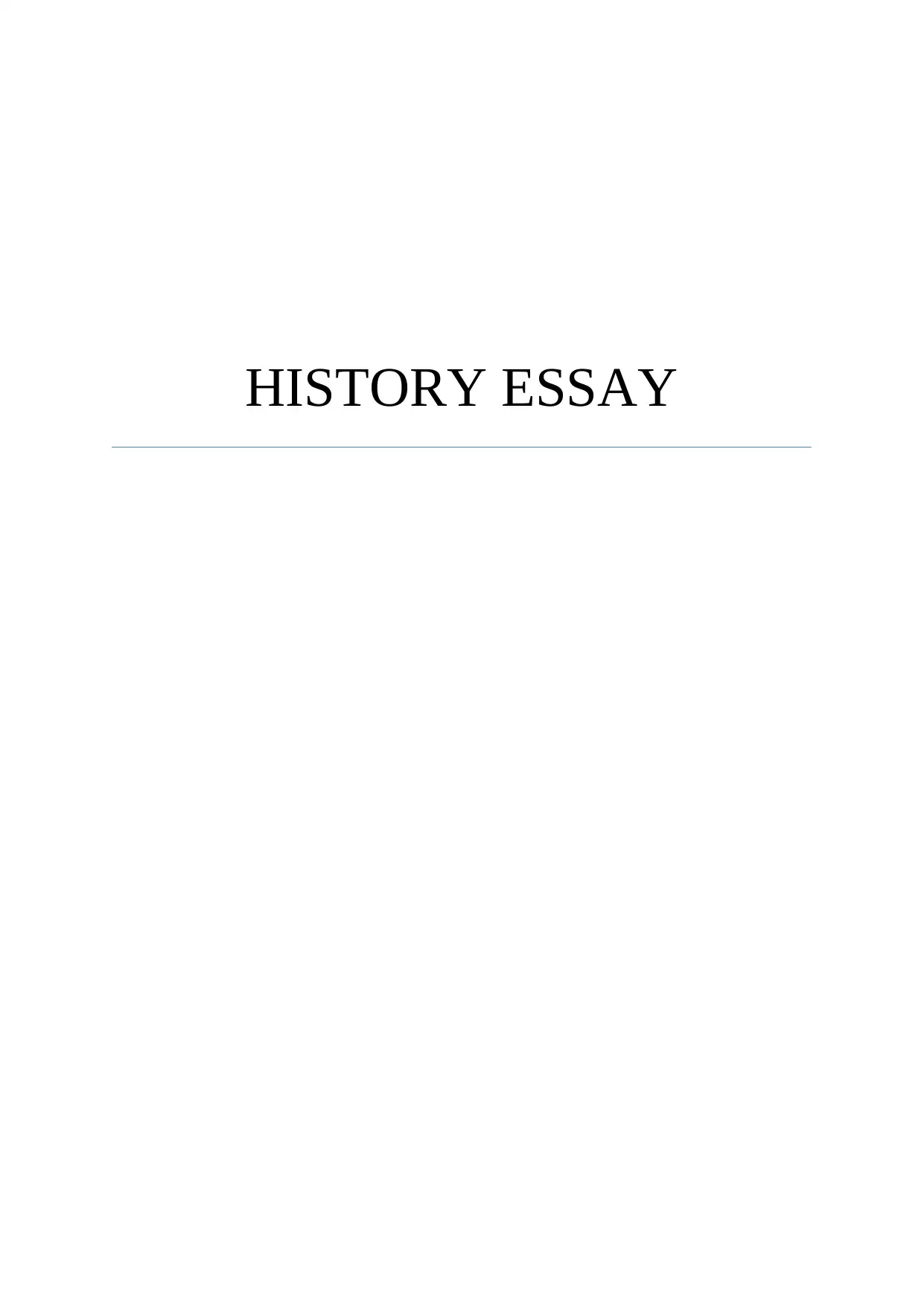
HISTORY ESSAY
Paraphrase This Document
Need a fresh take? Get an instant paraphrase of this document with our AI Paraphraser
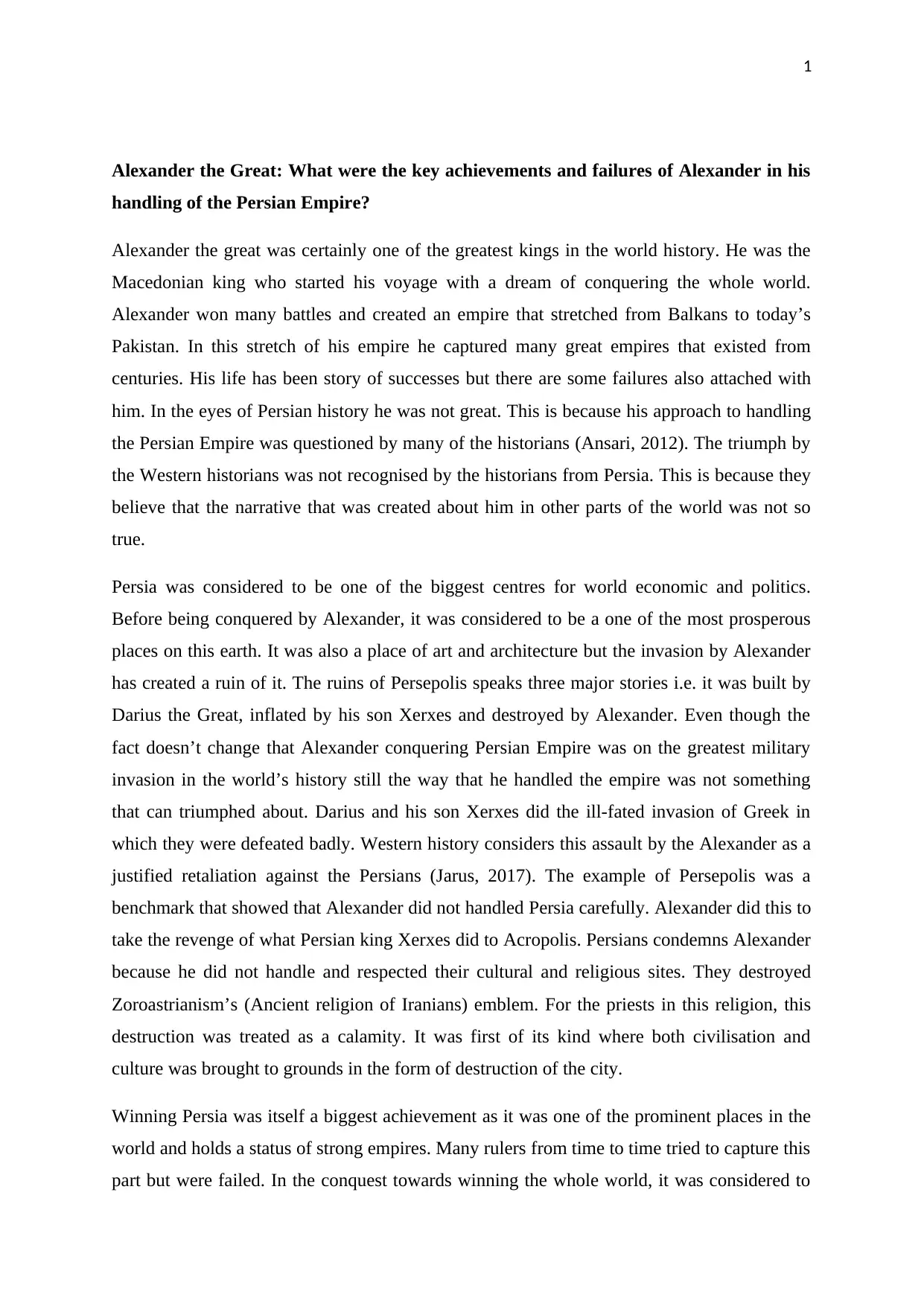
1
Alexander the Great: What were the key achievements and failures of Alexander in his
handling of the Persian Empire?
Alexander the great was certainly one of the greatest kings in the world history. He was the
Macedonian king who started his voyage with a dream of conquering the whole world.
Alexander won many battles and created an empire that stretched from Balkans to today’s
Pakistan. In this stretch of his empire he captured many great empires that existed from
centuries. His life has been story of successes but there are some failures also attached with
him. In the eyes of Persian history he was not great. This is because his approach to handling
the Persian Empire was questioned by many of the historians (Ansari, 2012). The triumph by
the Western historians was not recognised by the historians from Persia. This is because they
believe that the narrative that was created about him in other parts of the world was not so
true.
Persia was considered to be one of the biggest centres for world economic and politics.
Before being conquered by Alexander, it was considered to be a one of the most prosperous
places on this earth. It was also a place of art and architecture but the invasion by Alexander
has created a ruin of it. The ruins of Persepolis speaks three major stories i.e. it was built by
Darius the Great, inflated by his son Xerxes and destroyed by Alexander. Even though the
fact doesn’t change that Alexander conquering Persian Empire was on the greatest military
invasion in the world’s history still the way that he handled the empire was not something
that can triumphed about. Darius and his son Xerxes did the ill-fated invasion of Greek in
which they were defeated badly. Western history considers this assault by the Alexander as a
justified retaliation against the Persians (Jarus, 2017). The example of Persepolis was a
benchmark that showed that Alexander did not handled Persia carefully. Alexander did this to
take the revenge of what Persian king Xerxes did to Acropolis. Persians condemns Alexander
because he did not handle and respected their cultural and religious sites. They destroyed
Zoroastrianism’s (Ancient religion of Iranians) emblem. For the priests in this religion, this
destruction was treated as a calamity. It was first of its kind where both civilisation and
culture was brought to grounds in the form of destruction of the city.
Winning Persia was itself a biggest achievement as it was one of the prominent places in the
world and holds a status of strong empires. Many rulers from time to time tried to capture this
part but were failed. In the conquest towards winning the whole world, it was considered to
Alexander the Great: What were the key achievements and failures of Alexander in his
handling of the Persian Empire?
Alexander the great was certainly one of the greatest kings in the world history. He was the
Macedonian king who started his voyage with a dream of conquering the whole world.
Alexander won many battles and created an empire that stretched from Balkans to today’s
Pakistan. In this stretch of his empire he captured many great empires that existed from
centuries. His life has been story of successes but there are some failures also attached with
him. In the eyes of Persian history he was not great. This is because his approach to handling
the Persian Empire was questioned by many of the historians (Ansari, 2012). The triumph by
the Western historians was not recognised by the historians from Persia. This is because they
believe that the narrative that was created about him in other parts of the world was not so
true.
Persia was considered to be one of the biggest centres for world economic and politics.
Before being conquered by Alexander, it was considered to be a one of the most prosperous
places on this earth. It was also a place of art and architecture but the invasion by Alexander
has created a ruin of it. The ruins of Persepolis speaks three major stories i.e. it was built by
Darius the Great, inflated by his son Xerxes and destroyed by Alexander. Even though the
fact doesn’t change that Alexander conquering Persian Empire was on the greatest military
invasion in the world’s history still the way that he handled the empire was not something
that can triumphed about. Darius and his son Xerxes did the ill-fated invasion of Greek in
which they were defeated badly. Western history considers this assault by the Alexander as a
justified retaliation against the Persians (Jarus, 2017). The example of Persepolis was a
benchmark that showed that Alexander did not handled Persia carefully. Alexander did this to
take the revenge of what Persian king Xerxes did to Acropolis. Persians condemns Alexander
because he did not handle and respected their cultural and religious sites. They destroyed
Zoroastrianism’s (Ancient religion of Iranians) emblem. For the priests in this religion, this
destruction was treated as a calamity. It was first of its kind where both civilisation and
culture was brought to grounds in the form of destruction of the city.
Winning Persia was itself a biggest achievement as it was one of the prominent places in the
world and holds a status of strong empires. Many rulers from time to time tried to capture this
part but were failed. In the conquest towards winning the whole world, it was considered to
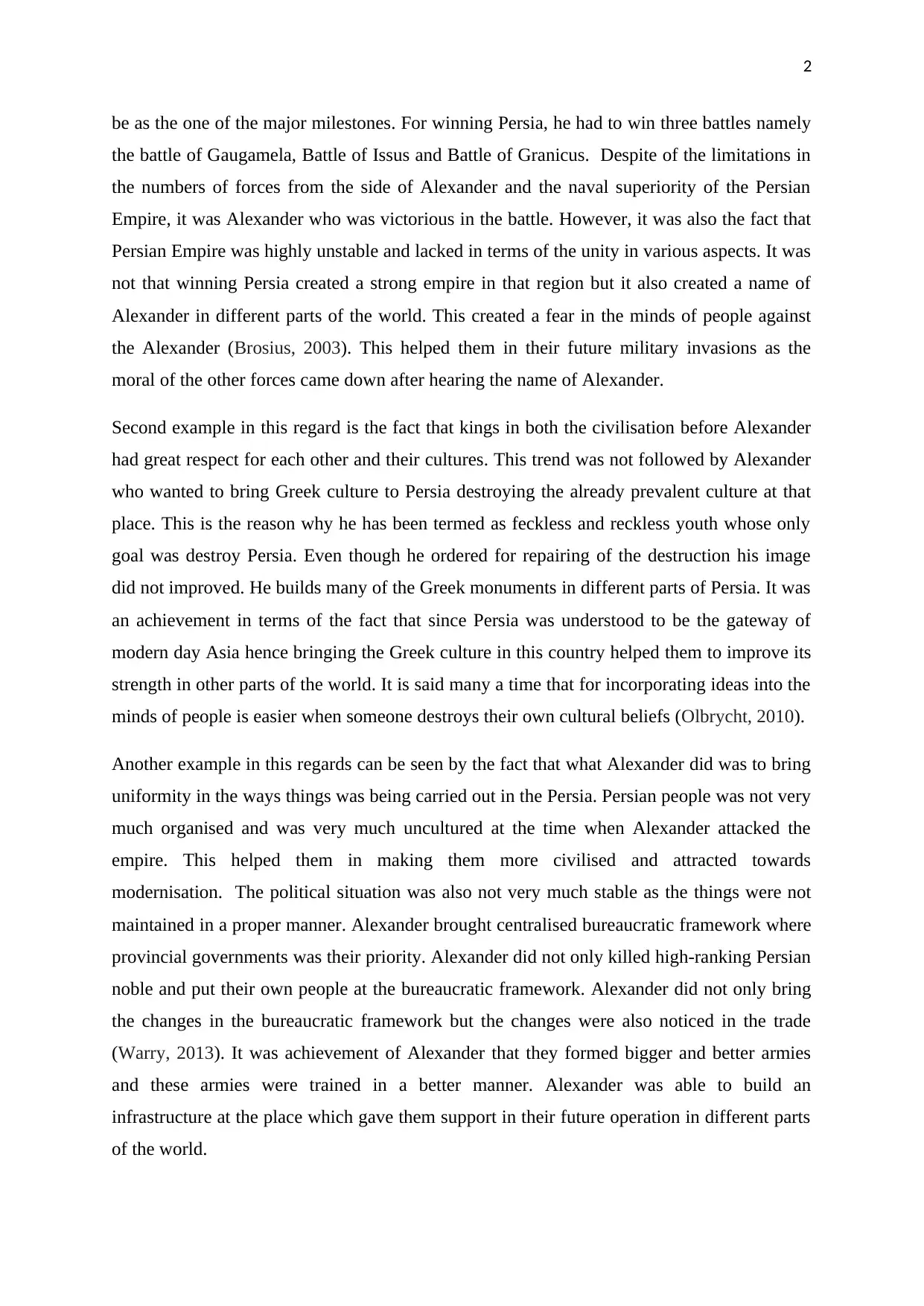
2
be as the one of the major milestones. For winning Persia, he had to win three battles namely
the battle of Gaugamela, Battle of Issus and Battle of Granicus. Despite of the limitations in
the numbers of forces from the side of Alexander and the naval superiority of the Persian
Empire, it was Alexander who was victorious in the battle. However, it was also the fact that
Persian Empire was highly unstable and lacked in terms of the unity in various aspects. It was
not that winning Persia created a strong empire in that region but it also created a name of
Alexander in different parts of the world. This created a fear in the minds of people against
the Alexander (Brosius, 2003). This helped them in their future military invasions as the
moral of the other forces came down after hearing the name of Alexander.
Second example in this regard is the fact that kings in both the civilisation before Alexander
had great respect for each other and their cultures. This trend was not followed by Alexander
who wanted to bring Greek culture to Persia destroying the already prevalent culture at that
place. This is the reason why he has been termed as feckless and reckless youth whose only
goal was destroy Persia. Even though he ordered for repairing of the destruction his image
did not improved. He builds many of the Greek monuments in different parts of Persia. It was
an achievement in terms of the fact that since Persia was understood to be the gateway of
modern day Asia hence bringing the Greek culture in this country helped them to improve its
strength in other parts of the world. It is said many a time that for incorporating ideas into the
minds of people is easier when someone destroys their own cultural beliefs (Olbrycht, 2010).
Another example in this regards can be seen by the fact that what Alexander did was to bring
uniformity in the ways things was being carried out in the Persia. Persian people was not very
much organised and was very much uncultured at the time when Alexander attacked the
empire. This helped them in making them more civilised and attracted towards
modernisation. The political situation was also not very much stable as the things were not
maintained in a proper manner. Alexander brought centralised bureaucratic framework where
provincial governments was their priority. Alexander did not only killed high-ranking Persian
noble and put their own people at the bureaucratic framework. Alexander did not only bring
the changes in the bureaucratic framework but the changes were also noticed in the trade
(Warry, 2013). It was achievement of Alexander that they formed bigger and better armies
and these armies were trained in a better manner. Alexander was able to build an
infrastructure at the place which gave them support in their future operation in different parts
of the world.
be as the one of the major milestones. For winning Persia, he had to win three battles namely
the battle of Gaugamela, Battle of Issus and Battle of Granicus. Despite of the limitations in
the numbers of forces from the side of Alexander and the naval superiority of the Persian
Empire, it was Alexander who was victorious in the battle. However, it was also the fact that
Persian Empire was highly unstable and lacked in terms of the unity in various aspects. It was
not that winning Persia created a strong empire in that region but it also created a name of
Alexander in different parts of the world. This created a fear in the minds of people against
the Alexander (Brosius, 2003). This helped them in their future military invasions as the
moral of the other forces came down after hearing the name of Alexander.
Second example in this regard is the fact that kings in both the civilisation before Alexander
had great respect for each other and their cultures. This trend was not followed by Alexander
who wanted to bring Greek culture to Persia destroying the already prevalent culture at that
place. This is the reason why he has been termed as feckless and reckless youth whose only
goal was destroy Persia. Even though he ordered for repairing of the destruction his image
did not improved. He builds many of the Greek monuments in different parts of Persia. It was
an achievement in terms of the fact that since Persia was understood to be the gateway of
modern day Asia hence bringing the Greek culture in this country helped them to improve its
strength in other parts of the world. It is said many a time that for incorporating ideas into the
minds of people is easier when someone destroys their own cultural beliefs (Olbrycht, 2010).
Another example in this regards can be seen by the fact that what Alexander did was to bring
uniformity in the ways things was being carried out in the Persia. Persian people was not very
much organised and was very much uncultured at the time when Alexander attacked the
empire. This helped them in making them more civilised and attracted towards
modernisation. The political situation was also not very much stable as the things were not
maintained in a proper manner. Alexander brought centralised bureaucratic framework where
provincial governments was their priority. Alexander did not only killed high-ranking Persian
noble and put their own people at the bureaucratic framework. Alexander did not only bring
the changes in the bureaucratic framework but the changes were also noticed in the trade
(Warry, 2013). It was achievement of Alexander that they formed bigger and better armies
and these armies were trained in a better manner. Alexander was able to build an
infrastructure at the place which gave them support in their future operation in different parts
of the world.
⊘ This is a preview!⊘
Do you want full access?
Subscribe today to unlock all pages.

Trusted by 1+ million students worldwide
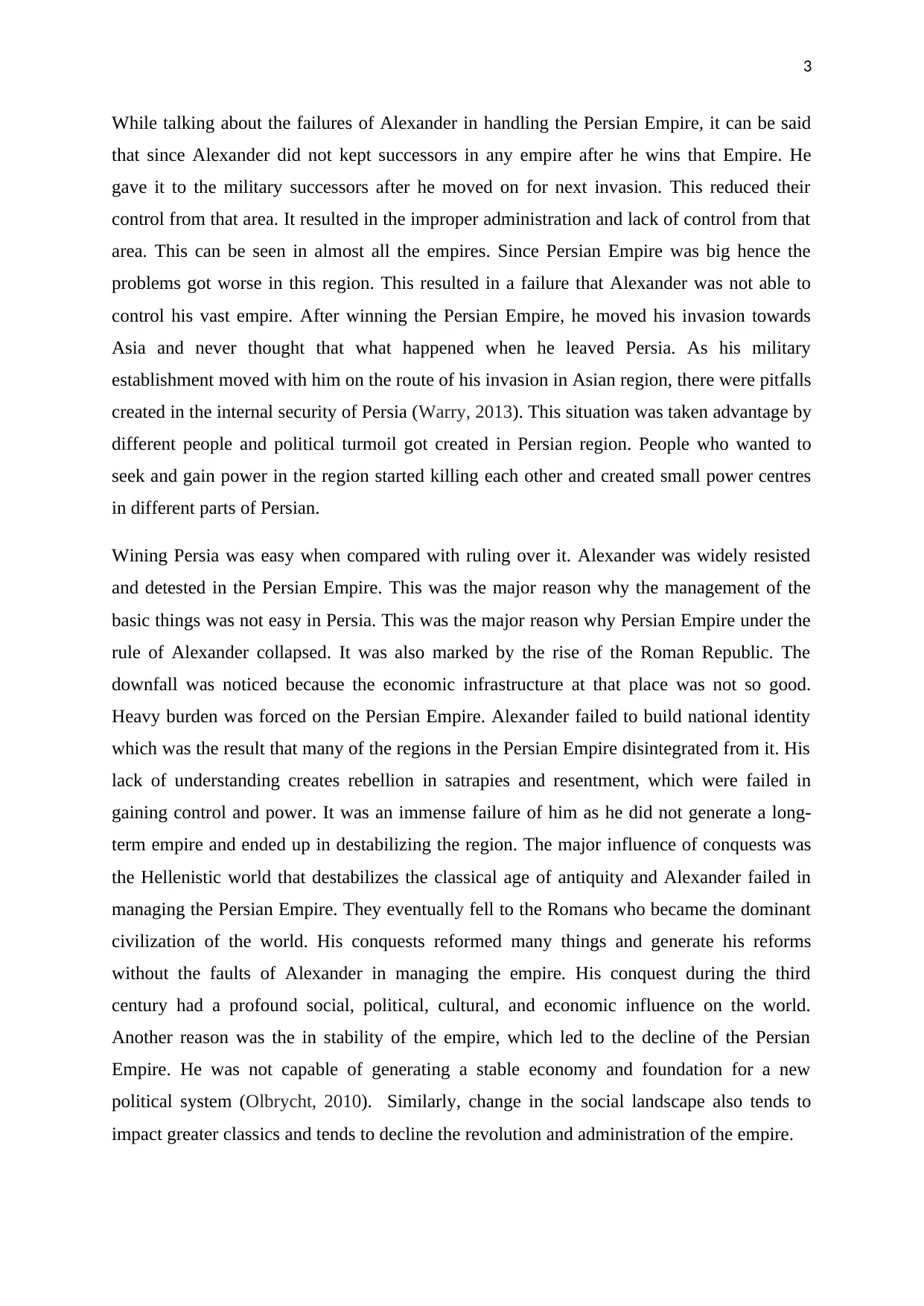
3
While talking about the failures of Alexander in handling the Persian Empire, it can be said
that since Alexander did not kept successors in any empire after he wins that Empire. He
gave it to the military successors after he moved on for next invasion. This reduced their
control from that area. It resulted in the improper administration and lack of control from that
area. This can be seen in almost all the empires. Since Persian Empire was big hence the
problems got worse in this region. This resulted in a failure that Alexander was not able to
control his vast empire. After winning the Persian Empire, he moved his invasion towards
Asia and never thought that what happened when he leaved Persia. As his military
establishment moved with him on the route of his invasion in Asian region, there were pitfalls
created in the internal security of Persia (Warry, 2013). This situation was taken advantage by
different people and political turmoil got created in Persian region. People who wanted to
seek and gain power in the region started killing each other and created small power centres
in different parts of Persian.
Wining Persia was easy when compared with ruling over it. Alexander was widely resisted
and detested in the Persian Empire. This was the major reason why the management of the
basic things was not easy in Persia. This was the major reason why Persian Empire under the
rule of Alexander collapsed. It was also marked by the rise of the Roman Republic. The
downfall was noticed because the economic infrastructure at that place was not so good.
Heavy burden was forced on the Persian Empire. Alexander failed to build national identity
which was the result that many of the regions in the Persian Empire disintegrated from it. His
lack of understanding creates rebellion in satrapies and resentment, which were failed in
gaining control and power. It was an immense failure of him as he did not generate a long-
term empire and ended up in destabilizing the region. The major influence of conquests was
the Hellenistic world that destabilizes the classical age of antiquity and Alexander failed in
managing the Persian Empire. They eventually fell to the Romans who became the dominant
civilization of the world. His conquests reformed many things and generate his reforms
without the faults of Alexander in managing the empire. His conquest during the third
century had a profound social, political, cultural, and economic influence on the world.
Another reason was the in stability of the empire, which led to the decline of the Persian
Empire. He was not capable of generating a stable economy and foundation for a new
political system (Olbrycht, 2010). Similarly, change in the social landscape also tends to
impact greater classics and tends to decline the revolution and administration of the empire.
While talking about the failures of Alexander in handling the Persian Empire, it can be said
that since Alexander did not kept successors in any empire after he wins that Empire. He
gave it to the military successors after he moved on for next invasion. This reduced their
control from that area. It resulted in the improper administration and lack of control from that
area. This can be seen in almost all the empires. Since Persian Empire was big hence the
problems got worse in this region. This resulted in a failure that Alexander was not able to
control his vast empire. After winning the Persian Empire, he moved his invasion towards
Asia and never thought that what happened when he leaved Persia. As his military
establishment moved with him on the route of his invasion in Asian region, there were pitfalls
created in the internal security of Persia (Warry, 2013). This situation was taken advantage by
different people and political turmoil got created in Persian region. People who wanted to
seek and gain power in the region started killing each other and created small power centres
in different parts of Persian.
Wining Persia was easy when compared with ruling over it. Alexander was widely resisted
and detested in the Persian Empire. This was the major reason why the management of the
basic things was not easy in Persia. This was the major reason why Persian Empire under the
rule of Alexander collapsed. It was also marked by the rise of the Roman Republic. The
downfall was noticed because the economic infrastructure at that place was not so good.
Heavy burden was forced on the Persian Empire. Alexander failed to build national identity
which was the result that many of the regions in the Persian Empire disintegrated from it. His
lack of understanding creates rebellion in satrapies and resentment, which were failed in
gaining control and power. It was an immense failure of him as he did not generate a long-
term empire and ended up in destabilizing the region. The major influence of conquests was
the Hellenistic world that destabilizes the classical age of antiquity and Alexander failed in
managing the Persian Empire. They eventually fell to the Romans who became the dominant
civilization of the world. His conquests reformed many things and generate his reforms
without the faults of Alexander in managing the empire. His conquest during the third
century had a profound social, political, cultural, and economic influence on the world.
Another reason was the in stability of the empire, which led to the decline of the Persian
Empire. He was not capable of generating a stable economy and foundation for a new
political system (Olbrycht, 2010). Similarly, change in the social landscape also tends to
impact greater classics and tends to decline the revolution and administration of the empire.
Paraphrase This Document
Need a fresh take? Get an instant paraphrase of this document with our AI Paraphraser
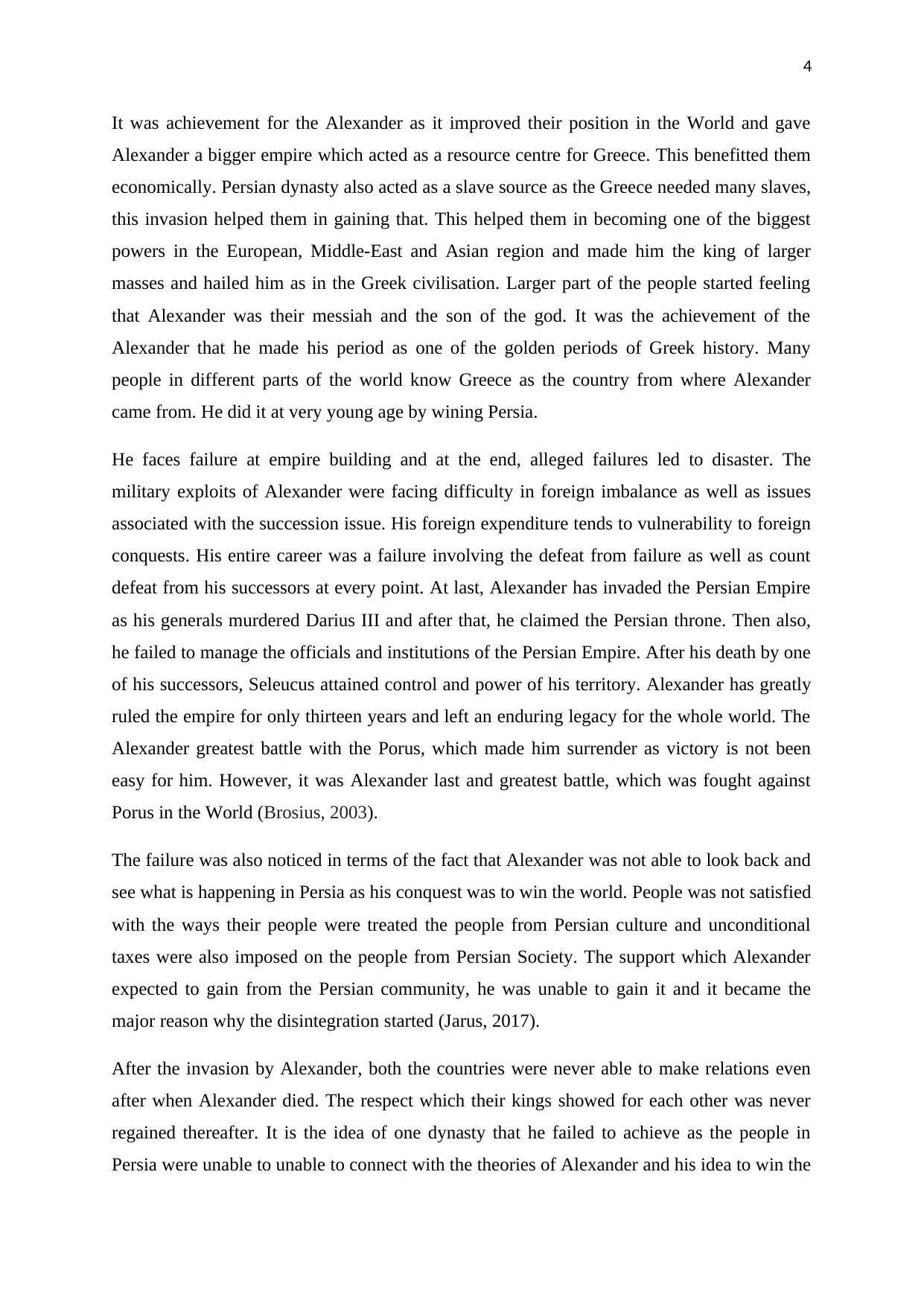
4
It was achievement for the Alexander as it improved their position in the World and gave
Alexander a bigger empire which acted as a resource centre for Greece. This benefitted them
economically. Persian dynasty also acted as a slave source as the Greece needed many slaves,
this invasion helped them in gaining that. This helped them in becoming one of the biggest
powers in the European, Middle-East and Asian region and made him the king of larger
masses and hailed him as in the Greek civilisation. Larger part of the people started feeling
that Alexander was their messiah and the son of the god. It was the achievement of the
Alexander that he made his period as one of the golden periods of Greek history. Many
people in different parts of the world know Greece as the country from where Alexander
came from. He did it at very young age by wining Persia.
He faces failure at empire building and at the end, alleged failures led to disaster. The
military exploits of Alexander were facing difficulty in foreign imbalance as well as issues
associated with the succession issue. His foreign expenditure tends to vulnerability to foreign
conquests. His entire career was a failure involving the defeat from failure as well as count
defeat from his successors at every point. At last, Alexander has invaded the Persian Empire
as his generals murdered Darius III and after that, he claimed the Persian throne. Then also,
he failed to manage the officials and institutions of the Persian Empire. After his death by one
of his successors, Seleucus attained control and power of his territory. Alexander has greatly
ruled the empire for only thirteen years and left an enduring legacy for the whole world. The
Alexander greatest battle with the Porus, which made him surrender as victory is not been
easy for him. However, it was Alexander last and greatest battle, which was fought against
Porus in the World (Brosius, 2003).
The failure was also noticed in terms of the fact that Alexander was not able to look back and
see what is happening in Persia as his conquest was to win the world. People was not satisfied
with the ways their people were treated the people from Persian culture and unconditional
taxes were also imposed on the people from Persian Society. The support which Alexander
expected to gain from the Persian community, he was unable to gain it and it became the
major reason why the disintegration started (Jarus, 2017).
After the invasion by Alexander, both the countries were never able to make relations even
after when Alexander died. The respect which their kings showed for each other was never
regained thereafter. It is the idea of one dynasty that he failed to achieve as the people in
Persia were unable to unable to connect with the theories of Alexander and his idea to win the
It was achievement for the Alexander as it improved their position in the World and gave
Alexander a bigger empire which acted as a resource centre for Greece. This benefitted them
economically. Persian dynasty also acted as a slave source as the Greece needed many slaves,
this invasion helped them in gaining that. This helped them in becoming one of the biggest
powers in the European, Middle-East and Asian region and made him the king of larger
masses and hailed him as in the Greek civilisation. Larger part of the people started feeling
that Alexander was their messiah and the son of the god. It was the achievement of the
Alexander that he made his period as one of the golden periods of Greek history. Many
people in different parts of the world know Greece as the country from where Alexander
came from. He did it at very young age by wining Persia.
He faces failure at empire building and at the end, alleged failures led to disaster. The
military exploits of Alexander were facing difficulty in foreign imbalance as well as issues
associated with the succession issue. His foreign expenditure tends to vulnerability to foreign
conquests. His entire career was a failure involving the defeat from failure as well as count
defeat from his successors at every point. At last, Alexander has invaded the Persian Empire
as his generals murdered Darius III and after that, he claimed the Persian throne. Then also,
he failed to manage the officials and institutions of the Persian Empire. After his death by one
of his successors, Seleucus attained control and power of his territory. Alexander has greatly
ruled the empire for only thirteen years and left an enduring legacy for the whole world. The
Alexander greatest battle with the Porus, which made him surrender as victory is not been
easy for him. However, it was Alexander last and greatest battle, which was fought against
Porus in the World (Brosius, 2003).
The failure was also noticed in terms of the fact that Alexander was not able to look back and
see what is happening in Persia as his conquest was to win the world. People was not satisfied
with the ways their people were treated the people from Persian culture and unconditional
taxes were also imposed on the people from Persian Society. The support which Alexander
expected to gain from the Persian community, he was unable to gain it and it became the
major reason why the disintegration started (Jarus, 2017).
After the invasion by Alexander, both the countries were never able to make relations even
after when Alexander died. The respect which their kings showed for each other was never
regained thereafter. It is the idea of one dynasty that he failed to achieve as the people in
Persia were unable to unable to connect with the theories of Alexander and his idea to win the
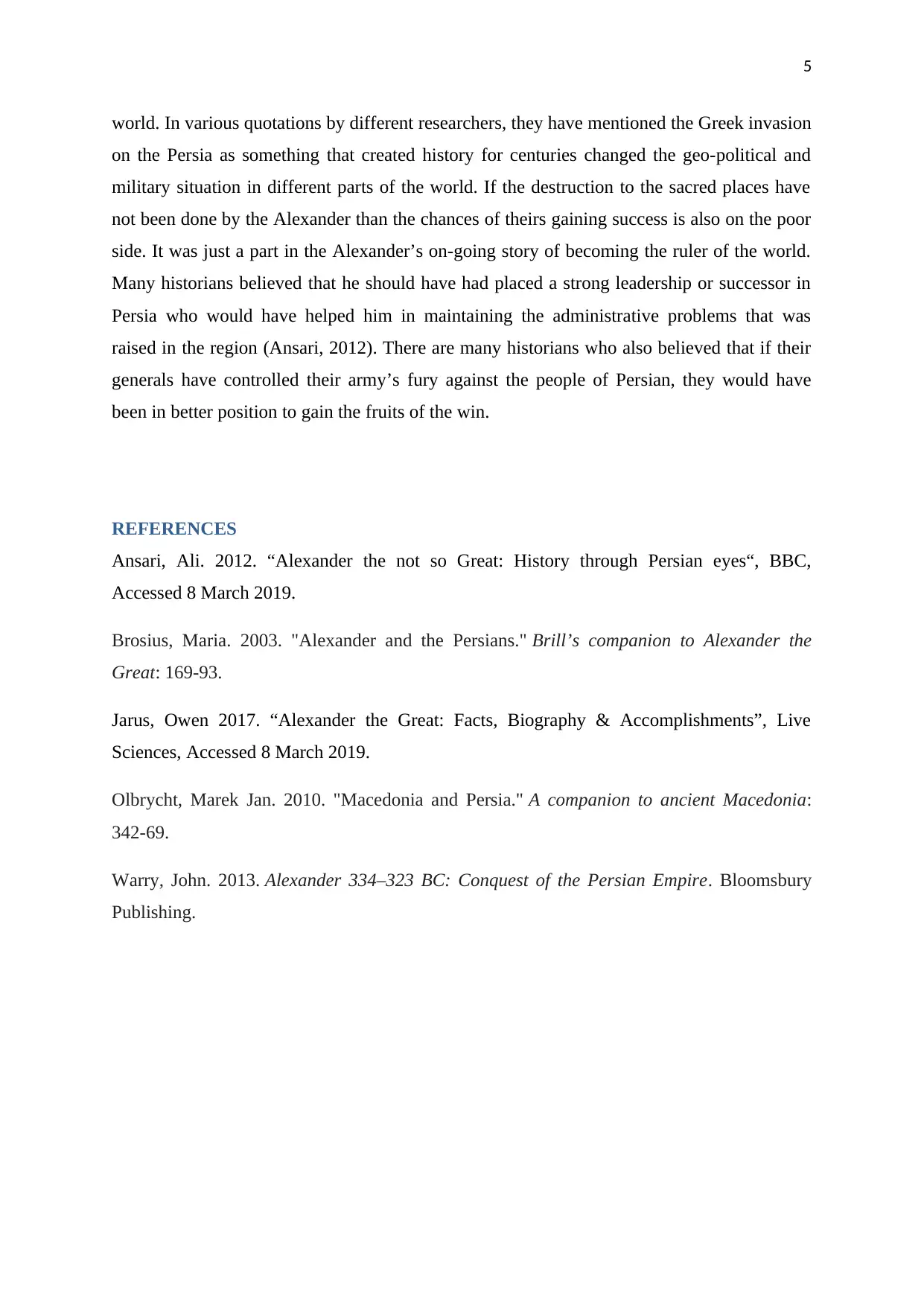
5
world. In various quotations by different researchers, they have mentioned the Greek invasion
on the Persia as something that created history for centuries changed the geo-political and
military situation in different parts of the world. If the destruction to the sacred places have
not been done by the Alexander than the chances of theirs gaining success is also on the poor
side. It was just a part in the Alexander’s on-going story of becoming the ruler of the world.
Many historians believed that he should have had placed a strong leadership or successor in
Persia who would have helped him in maintaining the administrative problems that was
raised in the region (Ansari, 2012). There are many historians who also believed that if their
generals have controlled their army’s fury against the people of Persian, they would have
been in better position to gain the fruits of the win.
REFERENCES
Ansari, Ali. 2012. “Alexander the not so Great: History through Persian eyes“, BBC,
Accessed 8 March 2019.
Brosius, Maria. 2003. "Alexander and the Persians." Brill’s companion to Alexander the
Great: 169-93.
Jarus, Owen 2017. “Alexander the Great: Facts, Biography & Accomplishments”, Live
Sciences, Accessed 8 March 2019.
Olbrycht, Marek Jan. 2010. "Macedonia and Persia." A companion to ancient Macedonia:
342-69.
Warry, John. 2013. Alexander 334–323 BC: Conquest of the Persian Empire. Bloomsbury
Publishing.
world. In various quotations by different researchers, they have mentioned the Greek invasion
on the Persia as something that created history for centuries changed the geo-political and
military situation in different parts of the world. If the destruction to the sacred places have
not been done by the Alexander than the chances of theirs gaining success is also on the poor
side. It was just a part in the Alexander’s on-going story of becoming the ruler of the world.
Many historians believed that he should have had placed a strong leadership or successor in
Persia who would have helped him in maintaining the administrative problems that was
raised in the region (Ansari, 2012). There are many historians who also believed that if their
generals have controlled their army’s fury against the people of Persian, they would have
been in better position to gain the fruits of the win.
REFERENCES
Ansari, Ali. 2012. “Alexander the not so Great: History through Persian eyes“, BBC,
Accessed 8 March 2019.
Brosius, Maria. 2003. "Alexander and the Persians." Brill’s companion to Alexander the
Great: 169-93.
Jarus, Owen 2017. “Alexander the Great: Facts, Biography & Accomplishments”, Live
Sciences, Accessed 8 March 2019.
Olbrycht, Marek Jan. 2010. "Macedonia and Persia." A companion to ancient Macedonia:
342-69.
Warry, John. 2013. Alexander 334–323 BC: Conquest of the Persian Empire. Bloomsbury
Publishing.
⊘ This is a preview!⊘
Do you want full access?
Subscribe today to unlock all pages.

Trusted by 1+ million students worldwide

6
1 out of 7
Related Documents
Your All-in-One AI-Powered Toolkit for Academic Success.
+13062052269
info@desklib.com
Available 24*7 on WhatsApp / Email
![[object Object]](/_next/static/media/star-bottom.7253800d.svg)
Unlock your academic potential
Copyright © 2020–2026 A2Z Services. All Rights Reserved. Developed and managed by ZUCOL.





